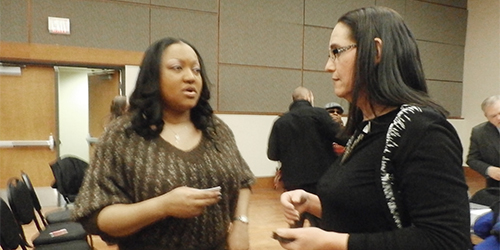
Detroit police officer Danni Woods meets LGBT community leaders. She is the new LGBT liaison for the Detroit Police Department. She and Commander Charles Wilson met with leaders form KICK!, Equality Michigan, Ruth Ellis Center, GINA and the ACLU at the first in a series of panel discussion events. BTL photo: Crystal Proxmire
Standing before about two-dozen LGBT community members from various organizations, Detroit Police Officer Danni Woods had an announcement that brought joy to those who looked on. "Just so the community knows, DPD is my family and you guys are my family. I've been married to my wife almost eight years, who is also a police officer. And I am just ready to get this going, because just like you guys need us, we need you in order to make Detroit a better place and beyond. So get used to this face."
Woods was recently appointed to be the first LGBT liaison for the Detroit Police Department. On Feb. 26, she and Commander Charles Wilson met with members of the LGBT community for a panel discussion about continuing to build a strong relationship. In 2012 the DPD and KICK began a year-long project which resulted in an LGBT relations policy and a plan for building community on an on-going basis. Wednesday's panel was the first of several they plan to have as a way of building trust and regular dialogue.
Jerry Peterson, executive director of the Ruth Ellis Center, expressed the spirit of the event and the hope that the LGBT community would be open to moving forward with the police. "We can become reflections of that trust, because trust is hard to come by," Peterson said. "It's going to take a while. Words are words at first, until actions really make them real. But I hope that all of us have the ability, being advocates for the community, we can also help nurture some appropriate levels of trust based on the teaching that happens. Those are two-way roles we need to play together."
Curtis Lipscomb, executive director for KICK explained the tumultuous history between DPD and the LGBT community that led up to this week's forum and the drastic changes that have happened in the level of respect between police and the community.
"Since the 1940s, Detroit has had a significant population of people who identified as homosexuals. Gay people sought to live in the areas along the Woodward corridor, ultimately landing and placing roots in the gay neighborhood of Palmer Park historic district. Palmer Park became the center of culture and community development. Night clubs, bars, restaurants, and public events flooded the intersection of 6 mile and Woodward Avenue. As a recent dissertation shows, before the 1970s, the relationship with Detroit Police and the gay community was highly antagonistic. Police not only targeted gays for accosting and soliciting, but they also targeted bars for being meeting places for homosexuals." While such harsh treatment is no longer prevalent, the legacy of those times remains in the memories of those still living according to Lipscomb.
Wilson fielded questions about a variety of concerns.
"When we met Mr. Lipscomb some of the issues we did not even understand or know they were there and they were brought to the forefront," he said. "And one of the first things we did was enact this police policy so we can have some specific guidelines for our officers and how they interact with the LGBT community."
Some Specifics
Access to hormones while incarcerated was a concern for those speaking on transgender issues, along with the use of proper pronouns. Wilson said that many people confuse Detroit with Wayne County. In Detroit people can only be held up to 48 hours without a warrant. He said that if people need medication they are accommodating, but that people are generally not in the holding cells for long.
As for names used he said, "We work with the perpetrator or the victim to determine what is the proper way to address the person." The policy also prohibits profiling based on sexual orientation or gender expression.
One area that Wilson asked for more assistance with, were cases of intimate partner violence. "A lot of time when officers arrive on a scene we have a very finite description of what is domestic violence, trying to determine a sexual relationship when you're living together. But a lot of times in the LGBT community, they have domestic violence but if doesn't fit within those parameters so how do we better define these parameters moving forward so they we can definitely constitute domestic violence as opposed to what looks like simple assault," he said.
Peterson brought to the table a concern that some of the youth at Ruth Ellis see while living on the streets: sex work.
"It's a very difficult topic for us to talk about, to get to understand, but I think it's important we remove all the barriers and decriminalize sex work, and understand, for example, if having condoms is evidence of prostitution, and what happens as a result of that and how destructive and harmful some of these kinds of policies are."
Rudy Serra, former judge and county commissioner, talked about a law that remains on the books that affects the entire state. "Stigma is an interesting concept. The laws that we enact tend to show what we accept and what we don't accept, so in the important case of Lawrence v. Texas, one of the things the United States Supreme Court said was the very existence of sodomy or gross indecency law stigmatizes LGBT people. Sodomy is still a felony in Michigan today. There is a statute called the abominable and detestable crime against nature [statute]. Michigan was not included in Lawrence v. Texas. There are men in prison today after Lawrence v. Texas under Michigan's sodomy felony. The Supreme Court says it stigmatizes us. The legislature needs to repeal it," Serra said.
Wilson assured the public that the years of targeting LGBT people are over, but if anyone feels they are being treated unfairly there is a way to handle it. "Any time you engage with an officer you feel is violating your rights or you feel is not doing his or her duties appropriately, first thing is to ask for a supervisor, always ask for a supervisor to respond to the scene," he said. He added that complaints are handled by an outside agency, not within the department.
Organizations included in the discussion were KICK, Equality Michigan, Ruth Ellis Center, Gender Identity Network Alliance, and the ACLU. Future forums will be announced through these organizations.











